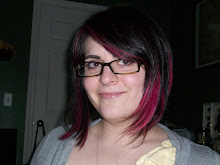I love a good book – one that I can enjoy equally in a bathrobe on my couch as in my heels during lunch breaks. I want to dig my fingers in and not be able to let go just as often as I want a casual read that's easy to slip back into after a few weeks.
My tastes vary from adventure to love, erotic to chaste (let's be honest where I lean here), and horror to mystery. I love a humorous Jen Lancaster memoir just as much as my DC Cupcakes cookbook.
It never really occurred to me to categorize the books I do and don't deign read based on their target age group, though. That's why this NY Times column by Joel Stein really rubbed me the wrong way. Go ahead and read it – since you're on my blog, you probably won't like it either.
I was an early reader. At five, I downed "The Little Prince" and never looked back. Like most voracious readers I know, I moved on to larger, more entertaining fare fast: pretty much anything by RL Stine and Christopher Pike, every one of the Babysitters' Club books and their "special" editions, Judy Bloom, Meg Cabot... If it was in the YA section in the 90s, I read it. Not one of these can be construed as "adult" in nature – and yet I still grew into a very accomplished editor and almost-published fiction author.
My skills with the written word most certainly did not come from reading adult fiction (since I didn't), but that doesn't mean you can discount any of my accomplishments. So why, oh why, does Mr Stein insist that I – and by extension, we – need to grow up and stop entertaining ourselves with books below our age group and, presumptively, below our intelligence level?
Right now, I'm reading a beautiful memoir about French cooking, marriage and the cultural differences between living in Paris vs. living in NYC. It's dense, sweet and full of big words on decidedly deep topics. Do I feel smarter for it? Sure, maybe. I also just finished my third read-through of "The Hunger Games," with its themes on politics, trust and oppression. Do I feel smarter for it? Hell yes. The commentary on the probable future of our reality is palpable and, in all truth, scary.
But "YA vs. Adult" isn't the real argument here, is it? This all stems from the idea of "Peter Pan" childhoods – those adults who are refusing to grow up. Not in the serious psychological or social sense, of course – just in the playful idea that you don't have to be so serious all the time. Examples: Those like my husband, who has vintage Transformers proudly displayed above his expensive software-engineering desktop for all to see. Those like me, whose movie shelves are filled with Pixar films, sappy chick flicks and superhero movies. The idea: It's still just as fun to watch "Dr. Who" and "Vampire Diaries" with my family as it was to watch "Dawson's Creek" with my college roommates.
And, on that note, I for damned sure don't want my two little boys knowing a world full of cynics like Mr. Stein, who clearly grew up too early into that cantankerous old man down the street with 100 lost baseballs in his fenced-in backyard.
I'll take my Cinderella engagement stories, my sparkly vampires, my boy-wizards and my dystopic heroines, thank you very much – and I won't be made to feel guilty about it for a second, especially by a mean-spirited narcissist who's forgotten how to have fun.
Now, grab a delicious cupcake (extra frosting, please), a cup of honeyed tea and a classical music CD, and join me on the couch to read whatever the heck you want to read. This is a no-judge zone.
Thursday, March 29, 2012
Subscribe to:
Comments (Atom)










